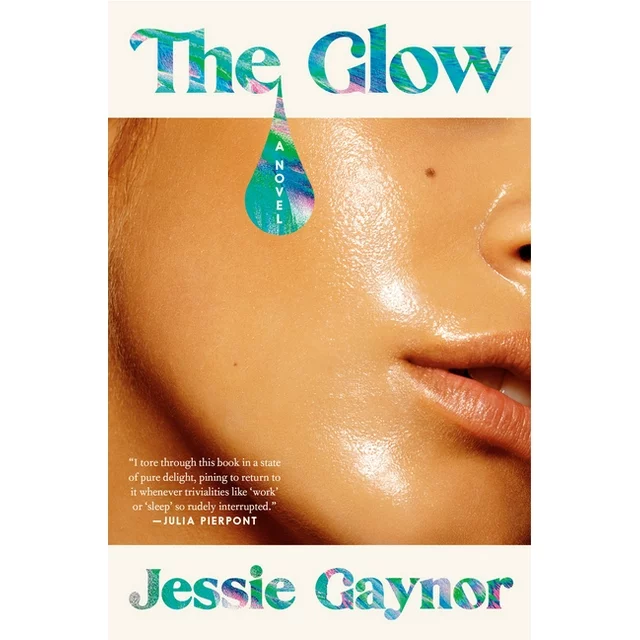
In Jessie Gaynor’s novel, The Glow, protagonist Jane Dorner is in a funk; her life seems to be going nowhere. Though Jane had aspirations of being a poet, she ended up dropping out of her grad program, and is now working in public relations for a New York City firm. Working in public relations may sound glamorous and lucrative, but Jane can barely care about her work and her output is slipshod at best.
And on top of her less than exciting job, Jane is now without a boyfriend after a break up and due to an emergency surgery, Jane is now drowning in medical debt (something I bet a lot of my fellow Americans can relate to). Jane is trying to hold onto her job so she can pay off her nearly six figure medical debt.
Needing a boost to her career, Jane seeks out something to inspire her so she can publicize it and perhaps save her job. And Jane thinks she’s found the perfect thing when she discovers Fort Path, a wellness retreat. At the helm of Fort Path, is Cass. Cass is beautiful, ethereal, and has a huge following on social media. Her Instagram passages promise wellness, healing, and the ultimate journey of self-fulfillment. Jane is drawn to both Fort Path and Cass, and she believes if she can connect with both of them, she will find not only a higher state of being, she will also amplify her career and keep her job.
Jane makes a sojourn to Fort Path. At first she has a hard time fitting in with the retreat’s strict diet and weird rituals, which includes group masturbation and refraining from showering. But still, Jane can’t help but be drawn to Cass. Cass just radiates self-confidence, wholeness, and true enlightenment. Perhaps if Jane follows Cass and Fort Path’s strict guideline, she, too, will achieve these lofty goals.
Whereas Cass may be the face and inspiration for Fort Path, it is her husband, Tom, who handles the business side of running the retreat. Jane gets closer to Cass and Tom, and often wonders about their marriage, especially since Tom doesn’t exactly seem 100% straight. Is it true love or a marriage of convenience. And once Jane loses her PR job, and finagles her way into a job with Fort Path, she finds out more and more about Cass and Tom’s marriage and the behind the scenes of running Fort Path.
Jane comes up with a plan. She figures with her public relations experience, she feels she can sell Fort Path on a grander scale (even if she herself, isn’t a true believer of Fort Path’s mission and practices). If Jane can put Fort Path on the wellness map and make Cass a major health guru on par with Gwyneth Paltrow and Goop. And to do this, Jane does some rather nefarious and less than savory things that are more about making the big bucks and exploiting Cass, Tom, and Fort Path than actually doing something positive for the the two of them, the retreat, and its clients. Will Jane make Fort Path a health and wellness a huge success and become a huge success herself? Or will everything tumble like a house of Tarot cards?
The Glow is a fascinating look at the rarified world of wellness and the people involved even though some of these people aren’t exactly good people. Sure, Cass and Tom may have an odd marriage. And I’m not a fan of Cass’s dietary and hygienic habits, but for the most part these are two well-meaning characters who are sympathetic.
However, Jane is a walking red flag. Though I empathize with her work and money troubles, I found her behavior towards Cass and Tom, and Fort Path to be appalling. Her exploitation is truly offensive. But I wondered is she truly an awful person or is her behavior due to the huge pressures, challenges, and set backs she has dealt. And I also questioned if our seeking out of enlightenment and a better life via a wellness retreat, a yoga class, or a candle smelling like Gwyneth Paltrow’s vagina is a panacea for the true systematic obstacles problems we face in modern society. The Glow prompts us to think a bit about those things.








 This novel explores the battle between boomers and millennials from the perspective of three people, Mark Brumfeld, his mother Julia, and Mark’s ex Cassie. In the beginning Mark has it all-a great career in media, a stellar education (he’s getting his PhD), a place in a bluegrass band, and Cassie. And then Mark loses it all and moves back in with his parents. Bitter, Mark dons a disguise, calls himself Boomer1 and uploads videos to YouTube solely blaming baby boomers for his lot in life. His videos go viral setting off a revolution and Cassie’s attention. Meanwhile Julia is dealing with her own issues.
This novel explores the battle between boomers and millennials from the perspective of three people, Mark Brumfeld, his mother Julia, and Mark’s ex Cassie. In the beginning Mark has it all-a great career in media, a stellar education (he’s getting his PhD), a place in a bluegrass band, and Cassie. And then Mark loses it all and moves back in with his parents. Bitter, Mark dons a disguise, calls himself Boomer1 and uploads videos to YouTube solely blaming baby boomers for his lot in life. His videos go viral setting off a revolution and Cassie’s attention. Meanwhile Julia is dealing with her own issues.